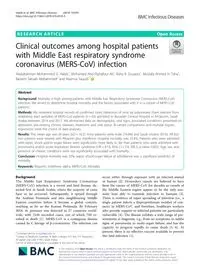
2019 Clinical outcomes among hospital patients with Middle East respiratory syndrome coronavirus (MERS-CoV) infection PDF
Preview 2019 Clinical outcomes among hospital patients with Middle East respiratory syndrome coronavirus (MERS-CoV) infection
RESEARCH ARTICLE Open Access Clinical outcomes among hospital patients with Middle East respiratory syndrome coronavirus (MERS-CoV) infection Abdulrahman Mohammed G. Habib1, Mohamed Abd Elghafour Ali1, Baha R. Zouaoui1, Mustafa Ahmed H. Taha1, Bassem Sahsah Mohammed2 and Nazmus Saquib1* Abstract Background: Mortality is high among patients with Middle East Respiratory Syndrome Coronavirus (MERS-CoV) infection. We aimed to determine hospital mortality and the factors associated with it in a cohort of MERS-CoV patients. Methods: We reviewed hospital records of confirmed cases (detection of virus by polymerase chain reaction from respiratory tract samples) of MERS-CoV patients (n = 63) admitted to Buraidah Central Hospital in Al-Qassim, Saudi Arabia between 2014 and 2017. We abstracted data on demography, vital signs, associated conditions presented on admission, pre-existing chronic diseases, treatment, and vital status. Bi-variate comparisons and multiple logistic regressions were the choice of data analyses. Results: The mean age was 60 years (SD = 18.2); most patients were male (74.6%) and Saudi citizens (81%). All but two patients were treated with Ribavirin plus Interferon. Hospital mortality was 25.4%. Patients who were admitted with septic shock and/or organ failure were significantly more likely to die than patients who were admitted with pneumonia and/or acute respiratory distress syndrome (OR = 47.9, 95% CI = 3.9, 585.5, p-value 0.002). Age, sex, and presence of chronic conditions were not significantly associated with mortality. Conclusion: Hospital mortality was 25%; septic shock/organ failure at admittance was a significant predictor of mortality. Keywords: Ribavirin, Interferon alpha, MERS-CoV, Mortality Background The Middle East Respiratory Syndrome Coronavirus (MERS-CoV) infection is a recent and fatal disease, de- tected first in Saudi Arabia, where the majority of cases have so far occurred. Subsequently, it spread through the Arabian Peninsula and into neighbouring Middle Eastern countries before it became a global concern, reaching as far as the Korean Peninsula. By February 2018, its presence was detected in 27 countries world- wide, with 2144 recorded cases, out of which 750 re- sulted in death [1]. MERS-CoV is a contagious disease caused by C lineage of β-coronavirus. The infection can occur either through exposure with an infected animal or human [2]. Dromedary camels are believed to have been the carrier of MERS-CoV for decades as camels of the Middle Eastern region appear to be the only zoo- notic host able to transmit infection to humans [3]. There is evidence of super spreading of infection (i.e., a single patient infects a disproportionate number of con- tacts) in MERS-CoV, and therefore, healthcare workers who provide support to infected patients are particularly vulnerable [4]. The disease exhibits a wide range of pre- sentations at diagnosis, e.g., from no symptoms to subtle signs of pneumonia to multi-organ failure, and has the capacity to progress rapidly to cause death [5, 6]. At present, there is no effective vaccine available to prevent this fatal infection [1]. © The Author(s). 2019 Open Access This article is distributed under the terms of the Creative Commons Attribution 4.0 International License (http://creativecommons.org/licenses/by/4.0/), which permits unrestricted use, distribution, and reproduction in any medium, provided you give appropriate credit to the original author(s) and the source, provide a link to the Creative Commons license, and indicate if changes were made. The Creative Commons Public Domain Dedication waiver (http://creativecommons.org/publicdomain/zero/1.0/) applies to the data made available in this article, unless otherwise stated. * Correspondence:
